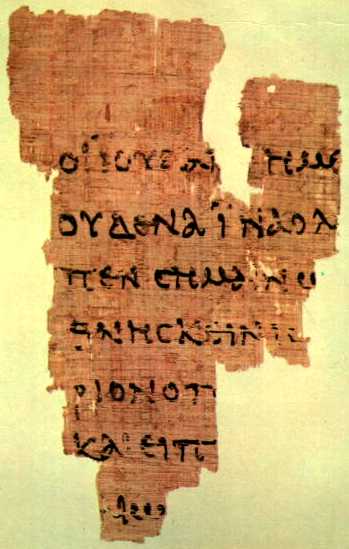For the New Testament the evidence is overwhelming. There are 5,366 manuscripts to compare and draw information from, and some of these date from the second or third centuries. To put that in perspective, there are only 643 copies of Homer's Iliad, and that is the most famous book of ancient Greece! No one doubts the existence of Caesar's Gallic Wars, but we have only 10 copies of it and the earliest of those was made 1000 years after it was written. To have such an abudance of copies of the New Testament from dates within 70 years after their writing is amazing.
I prematurely had to stop you there, I was going to bring forth various points one being the dating of these 5,000 manuscripts, what you wrote,
To have such an abudance of copies of the New Testament from dates within 70 years after their writing is amazing. I find this statement abit confusing, someone who had not read on this would have thought you'd mean that all 5.000 and so forth were written within that, rather, what we do have is less than 500 within the first 900 years right or wrong?
And what is interesting is the earliest is dated about 125-150? And is fragmentary, it is like this size:
Indeed the New Testament is the most well-preserved and authenticated of all ancient Greek manuscripts ever to have been written.
What you also fail to see is that all the manuscript evidence could ever ever show is what was first written by the authors of the 4 Gospels, but this is of itself not enough, since the Gospels now testify to changes made by the authors themselves to make Jesus look better as time went on, we find in the Gospel of Mark a Jesus which is then made to look more Lord like in Matthew which scholars hold to be written later, so as it went on the author of Matthew made changes to the same stories, this is a shattering blow to the reliability of these unknown authors. So even if we had the originals, we would then have to ask;
1. Did the authors convey truly what they heard sincerily and
2. If they done it sincerly how do we know they were not sincerly wrong and got it from the many oral traditions running around at the time.
As for the Hebrew Old Testament, the discovery of the Dead Sea scrolls in the mid 1900s showed how well its text had been maintained. Scholars were able to make comparison between the 800 CE Masoretic text used by Jews today and compare it with the 200 BCE texts found written on the scrolls and the differences were primarily in the form of changes in word spellings.
As for the Dead Sea scrolls I am currently trying to read up on these findings, but what I have read, maybe you can clarify is that between the Masoretic Hebrew text and the Samaritan Pentateuch and the Septuagint there are 6000 discrepancies, i.e. The Samaritan Pentateuch and the Septaugint agreed against the Masoretic Hebrew text.
Regards,
Eesa
EDIT: As for the Archeology, is there not a statement that Jesus was baptised at betheny beyond the jordan but people tried to change it to bethebara since betheny is apparently incorrect?
King James Version (KJV)
28These things were done in Bethabara beyond Jordan, where John was baptizing.
New International Version (NIV)
28This all happened at Bethany on the other side of the Jordan, where John was baptizing.
21st Century King James Version (KJ21)
28These things were done in Bethabara beyond the Jordan, where John was baptizing.
Young's Literal Translation (YLT)
28These things came to pass in Bethabara, beyond the Jordan, where John was baptizing,
New Living Translation (NLT)
28 This encounter took place in Bethany, an area east of the Jordan River, where John was baptizing.

